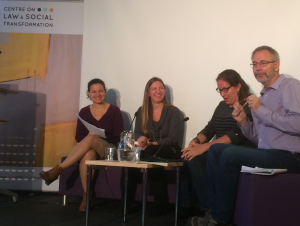The Centre on Law & Social Transformation/CMI has received 10 million NOK from the Research Council of Norway for a research project on water rights. The project ‘Elevating water rights to human rights: Has it strengthened marginalized peoples’ claim for water?’ ask if the recognition of a human right to water has made states more accountable to their populations in providing access to clean water for poor sectors of society.
Water scarcity remains a huge and increasing problem in many countries, as industrial demands for water compete with the water needs of a growing population and with climate change exacerbating the problems. Globally, 750 million people do not have access to clean water and 2.5 billion lack adequate sanitation causing millions of deaths every year. In 2010, the UN General Assembly declared water as an independent human right, thereby creating an internationally binding mechanism to pursue the right to water. This is seen as an important tool for improving access to water for the poor and marginalized – but has it been of help?
There is a knowledge gap with regard to what the international recognition of the human right to water actually means for the empowerment of socially and marginalized people, and how it most effectively can be used to protect and enforce their human right to water.
The project ‘Elevating water rights to human rights: Has it strengthened marginalized peoples’ claim for water?’ aims to fill this knowledge gap through three separate, but intertwined, parts: First, the project team will conduct five country case studies of attempts to enforce the human right to water through litigation, legal reforms, the use of UN mechanisms and political mobilization (Brazil, Costa Rica, India, Peru and South Africa). Second, the researchers will assess the impact of water disputes in terms of human development; and third, they will develop a database of water rights-related cases handled by domestic Constitutional or Superior courts for all countries in the world and at international courts and tribunals.
By improving our understanding of the potential of rights based strategies in securing access to clean water for marginalized populations, the project also aims to contributing to the understanding of rights as instruments of pro-poor social change and methods for empirically assessing effects of rights and lawfare.
The project is a collaboration with LawTransform Fellows at a number of institutions: Bruce Wilson (PI), Lara Côrtes, Camila Gianella and Malcolm Langford from the CMI, Tore Sætersdal and Siri Gloppen from the University of Bergen, Danel Brinks from the University of Texas at Austin, Jackie Dugard from the University of Witwatersrand School of Law in Johannesburg, Namita Wahi from the Centre for Policy Research in Delhi and the Research Center at the University of the Pacific in Peru.

